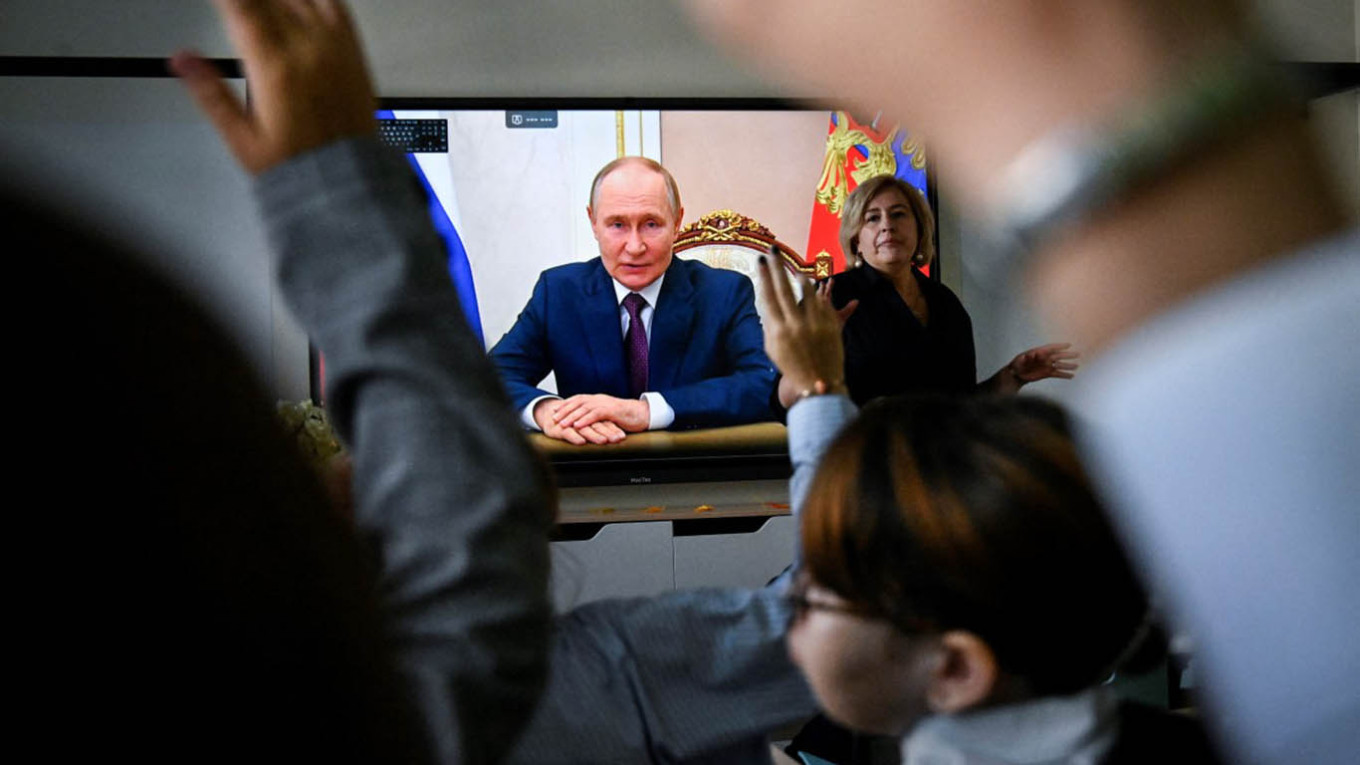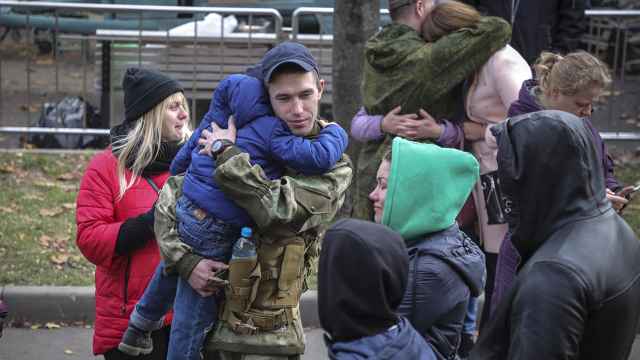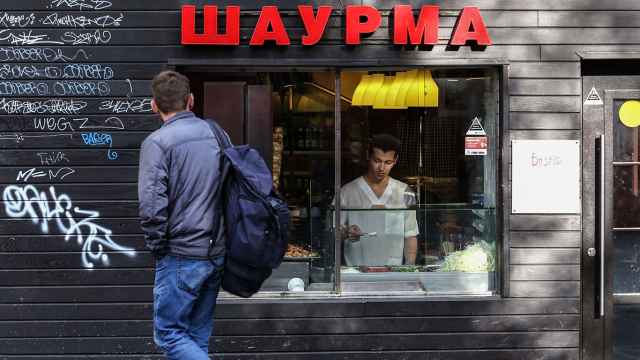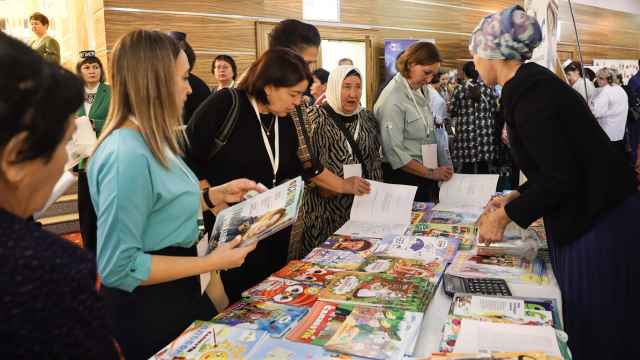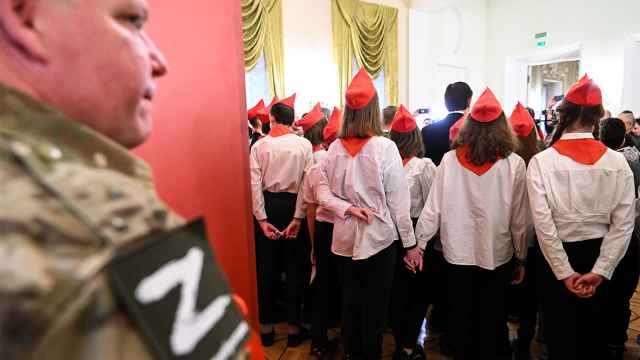Schoolchildren and university students across Russia marked the start of the new school year on Monday in a tradition known as Knowledge Day.
Under President Vladimir Putin, the Kremlin has worked to mold school and university curricula to promote its agenda among Russia’s youth, gradually transforming educational institutions into ideological battlegrounds.
This process has ramped up since the invasion of Ukraine, with weekly patriotic lessons, new history textbooks teaching the Kremlin’s narrative and hiked spending on militarized youth programs.
This year, students in Russia will once again find their classrooms transformed by the war — that is, if they are fortunate to gain access to an education system that is increasingly exclusionary toward entire communities.
Anti-migrant admission practices
Starting this school year, the children of migrants will be barred from attending school unless they pass a Russian language proficiency exam and can provide proof of residency.
Rights advocates have heavily criticized the new law, which came into effect in April, warning that it would socially isolate migrant children and provide fertile ground for their radicalization and involvement in criminal activities.
Olga Abramenko, an expert at the Memorial Anti-Discrimination Center, told Novaya Gazeta Europe that although many other countries require admission tests for migrant children, “it is by no means intended to ‘weed out children unworthy of education’.”
“Its purpose [in other countries] is to outline their educational pathway [and] create integration classes with intensive language instruction…Nowhere else in the world is there a practice [of segregation] like the one currently used in Russia,” said Abramenko.
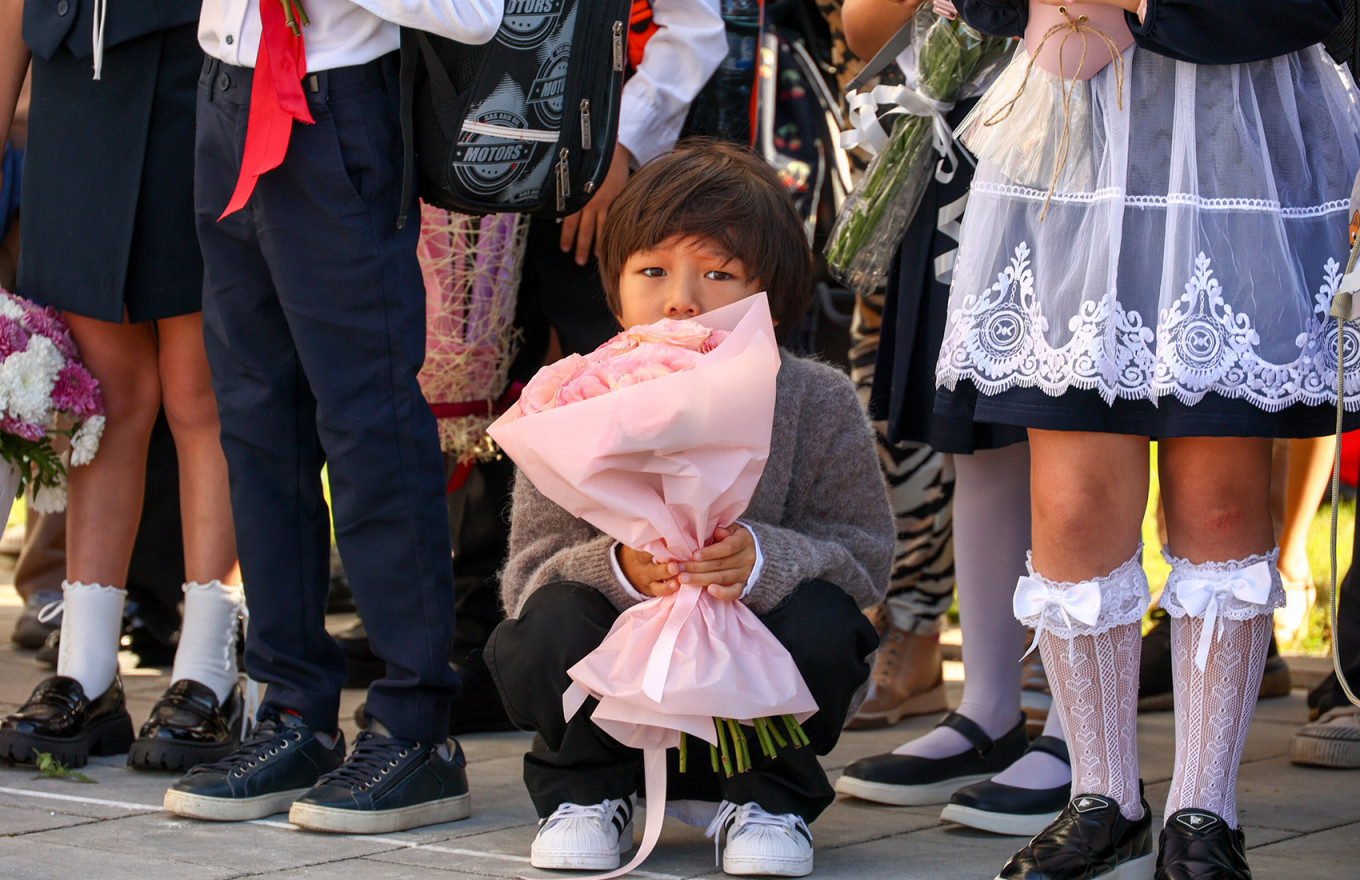
Eighty-one percent of the 1,800 foreign children who applied for admission to Russian schools this year were barred from taking the mandatory language proficiency test due to application errors or a lack of required documents, according to statistics obtained by the RBC business daily.
While authorities have yet to release countrywide data on how many migrant children started school on Sept. 1, regional statistics published by State Duma Speaker Vyacheslav Volodin suggest that the majority of those registered for the language proficiency test failed it.
Only three of 14 test takers in the northern republic of Komi received a passing grade, while in the Sverdlovsk region, that number was just 13 of 66, according to Volodin.
Volodin’s claim that “every tenth child without Russian citizenship did not pass the test” in the republic of Tatarstan prompted the republic’s head Rustam Minnikhanov to emerge as the first high-ranking critic of the new admission practices.
“How can you not let a child go to school? Where should he be?... Any child will learn the language in three or four months. It's nothing to worry about,” Minnikhanov said at a public meeting with education sector employees in August, tasking the region’s education ministry to offer free Russian language courses for migrant children.
“We cannot do without migrants — they are our labor force…And for the most part, they are law-abiding, able-bodied citizens,” Minnikhanov added.
Meanwhile, a select few migrant pupils will be subjected to additional surveillance by school personnel, who were tasked with identifying “tendencies toward illegal behavior” among migrant children in line with new Education Ministry guidelines.
Sidelining of Indigenous languages
Starting Sept. 1, the total number of hours allocated to the study of Indigenous languages and literature in first-grade classes across all Russian schools will be reduced to just one hour per week.
More than 30 languages native to Russia are recognized as official in its 21 ethnic republics. On paper, this special legal status allows these Indigenous languages to be used in lawmaking, court proceedings and as the language of school instruction.
In reality, their use is being increasingly limited to the home, particularly following the Kremlin’s decision to ban the compulsory teaching of these languages in Russia’s ethnic republics in 2017.
Teachers, activists and even high-ranking officials in Tatarstan, Sakha (Yakutia), Altai and Mari El vocally condemned the Education Ministry’s decision to reduce language instruction hours when it was announced in July.
“One hour of language instruction cannot yield any tangible results,” a former Tatar language teacher in Tatarstan’s capital Kazan told The Moscow Times.
“Even motivated adults who study languages with paid private tutors for two hours a week often find that it is not enough, so what can be said about one person teaching an entire class of 30 largely unmotivated schoolchildren for one hour per week?” they said, requesting anonymity for safety reasons.
Describing the decision to maintain any kind of language instruction as a “purely symbolic move,” the teacher noted that even the two to three hours per week previously allocated to the study of Indigenous languages was insufficient to ensure their vitality amid the dominance of the Russian language.
“Reducing the number of language instruction hours in first grade is just the beginning. I expect the measure will be extended to middle school and high school soon,” said the teacher. “It is a catastrophe.”
Expansion of patriotic education
At least 100 preschools across Russia and occupied parts of Ukraine marked Sept. 1 with the first “Important Conversations” lessons for children aged 3 to 7 as part of a pilot initiative aimed at expanding a program endorsed by Putin.
First introduced in primary and secondary schools shortly after the full-scale invasion of Ukraine, the new “Important Conversations” for children will aim to teach “respect for Russian culture and history, love for the Motherland” and family values, according to the Education Ministry.
The ministry also released a list of 37 “patriotic” songs it recommends teachers use in school music lessons that ranges from Soviet classics like David Tukhmanov’s “Victory Day” to contemporary tracks by pro-war pop singer Shaman.
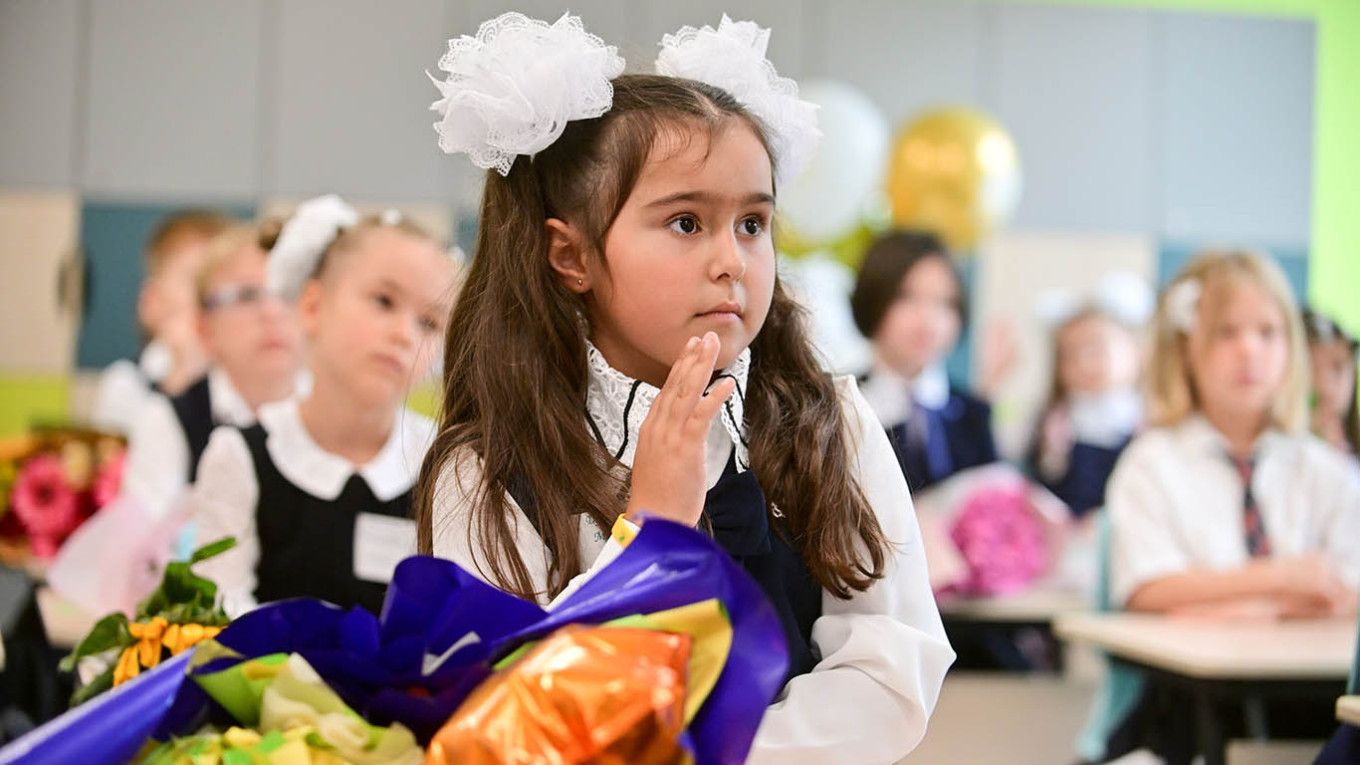
New communication rules
Teachers, schoolchildren and their parents are being pushed to relocate all chats to Max, a homegrown app expected to become Russia’s national messaging platform similar to China’s WeChat.
Teachers and parents from several different regions of Russia confirmed this change to The Moscow Times.
Though still in its testing phase, Max has already earned a reputation for its striking lack of privacy, as its developer VK shares the app’s data with the security services.
Military families take over
University admission quotas for veterans of the Ukraine war and members of the security services stationed in occupied Ukrainian territories — as well as their children — have been in place since 2023, with the number of people enrolled through them growing each year.
Nearly 3,000 Ukraine war veterans and their children enrolled at Russia’s top 18 highest-ranking universities this year, a 58% increase compared to last year, according to a study by the exiled investigative outlet IStories.
Enrollment data analyzed by IStories suggests that more than 70% of students enrolled through quotas would not meet the admission criteria for the same universities if competing on an equal basis with other applicants.
The Kremlin, meanwhile, plans to expand the program to include wives and widows of Ukraine war veterans starting in 2026.
“Universities remain refuges for abstract thinkers and quiet dissenters. Wives and widows of veterans, admitted under preferential terms. will shift the makeup of these institutions toward the Kremlin’s favor,” scholar Yan Levchenko wrote in a recent op-ed for The Moscow Times.
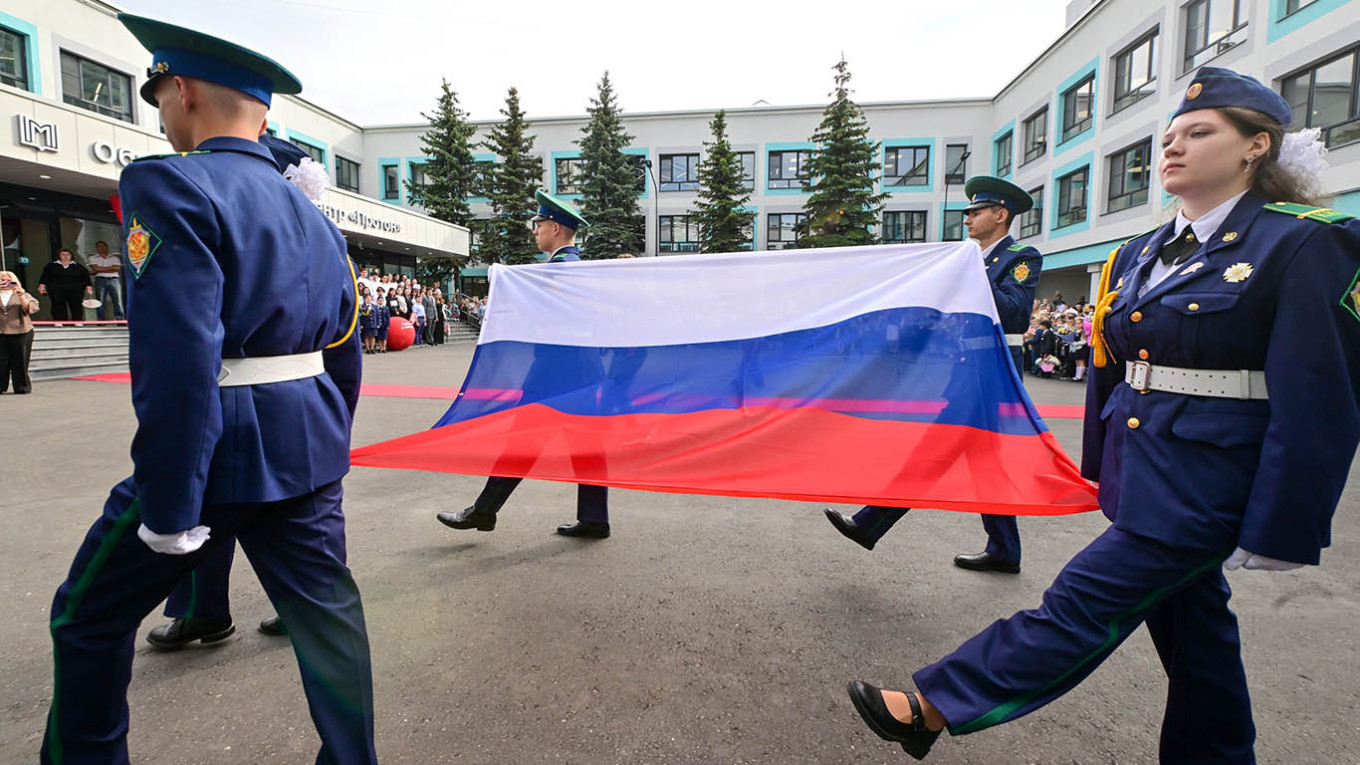
Meanwhile, the total number of government-subsidized spots available across all Russian universities fell by 2,000 compared to last year and tuition fees continued to rise, making higher education even less accessible for the average Russian teenager.
Ukraine war veterans are also becoming increasingly present in the ranks of teaching personnel across Russian schools.
Soldiers who fought in Ukraine have participated in as many as 40,000 patriotic lessons since the February 2022 invasion and at least 100 demobilized soldiers are currently employed as teachers, according to an investigation by Novaya Gazeta Europe.
Veterans have been appointed as school principals in at least four known cases, according to media reports.
Most recently, Ukraine war veteran Vladimir Sterekhov became the head of a school in Yekaterinburg, Russia’s fourth-largest city.
"My task is to support the unique space where everyone can comfortably develop, gain new knowledge and reach new heights. We will be building a school of the future: modern, creative, open to new ideas and technologies," news outlets cited Sterekhov as saying.
A Message from The Moscow Times:
Dear readers,
We are facing unprecedented challenges. Russia's Prosecutor General's Office has designated The Moscow Times as an "undesirable" organization, criminalizing our work and putting our staff at risk of prosecution. This follows our earlier unjust labeling as a "foreign agent."
These actions are direct attempts to silence independent journalism in Russia. The authorities claim our work "discredits the decisions of the Russian leadership." We see things differently: we strive to provide accurate, unbiased reporting on Russia.
We, the journalists of The Moscow Times, refuse to be silenced. But to continue our work, we need your help.
Your support, no matter how small, makes a world of difference. If you can, please support us monthly starting from just $2. It's quick to set up, and every contribution makes a significant impact.
By supporting The Moscow Times, you're defending open, independent journalism in the face of repression. Thank you for standing with us.
Remind me later.



